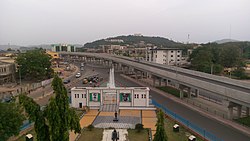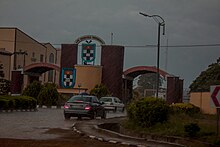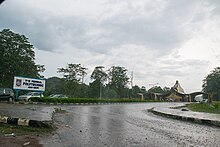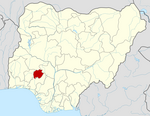Ado Ekiti
 From Wikipedia - Reading time: 10 min
From Wikipedia - Reading time: 10 min
This article needs additional citations for verification. (November 2012) |
Ado Ekiti
Ado Ewi | |
|---|---|
 Ado Ekiti Fajuyi park | |
| Coordinates: 7°37′16″N 5°13′17″E / 7.62111°N 5.22139°E | |
| Country | Nigeria |
| State | Ekiti State |
| Area | |
• Total | 293 km2 (113 sq mi) |
| Elevation | 455 m (1,493 ft) |
| Population (2006 census) | |
• Total | 313,690 |
• Estimate (2022) | 469,700[1] |
| • Density | 1,100/km2 (2,800/sq mi) |
| National language | Yorùbá |
 | |
Ado Ekiti is the capital city of Ekiti State, Nigeria. It is the headquarter of the Ekiti central senatorial district, southwest, Nigeria.[2]
History
[edit]Ado Ekiti is an ancient city, founded by Ewi Awamaro the son of Biritikolu. Awamaro (the restless one) left Ile-Ife with his father Ewi Apa Biritikolu and his uncle Oranmiyan to Ita Orogun and Benin respectively after staying briefly with Oloba in Oba-Ile in present-day Akure.
Both Oranmiyan (Oba of Benin) and Biritikolu first settled in Benin forests before disputes among their people led them to separate and Biritikolu sought a new home westward at Utamodi (Oke Papa). Ewi Biritikolu and one of his sons reigned there. It was Ewi Awamaro who migrated to Ilesun (Present day Ado-Ekiti) after staying briefly at Udoani (Ido Ani) and Agbado during the long migration. When Ewi Awamaro left Agbado, some elders remained behind to rest and gave the settlement the name Agba Ado (Elders' Camp) – Agbado-Ekiti as the town is known today.
Population and demographics
[edit]The population in 2006 was 308,621. The people of Ado Ekiti are mainly of the Ekiti sub-ethnic group of the Yoruba.[3]
Climate
[edit]The rainy season in Ado-Ekiti is humid, oppressive, and cloudy, while the dry season is warm, muggy, and partially cloudy. The average annual temperature ranges from 64 to 90 °F (32 °C), rarely falling below 58 or rising over 95.
The greatest time of year to visit Ado-Ekiti for hot-weather activities, according to the beach/pool score, is from early November to late February.[4]
| Climate data for Ado Ekiti (1991–2020) | |||||||||||||
|---|---|---|---|---|---|---|---|---|---|---|---|---|---|
| Month | Jan | Feb | Mar | Apr | May | Jun | Jul | Aug | Sep | Oct | Nov | Dec | Year |
| Record high °C (°F) | 39.0 (102.2) |
39.0 (102.2) |
38.0 (100.4) |
37.0 (98.6) |
35.1 (95.2) |
33.4 (92.1) |
32.8 (91.0) |
32.0 (89.6) |
32.3 (90.1) |
34.0 (93.2) |
37.0 (98.6) |
37.1 (98.8) |
39.0 (102.2) |
| Mean daily maximum °C (°F) | 33.3 (91.9) |
34.6 (94.3) |
33.9 (93.0) |
32.4 (90.3) |
31.3 (88.3) |
29.8 (85.6) |
28.4 (83.1) |
27.8 (82.0) |
28.9 (84.0) |
30.3 (86.5) |
32.4 (90.3) |
33.2 (91.8) |
31.4 (88.5) |
| Daily mean °C (°F) | 26.3 (79.3) |
28.1 (82.6) |
28.4 (83.1) |
27.5 (81.5) |
26.8 (80.2) |
25.8 (78.4) |
25.0 (77.0) |
24.6 (76.3) |
25.2 (77.4) |
26.0 (78.8) |
27.0 (80.6) |
26.4 (79.5) |
26.4 (79.5) |
| Mean daily minimum °C (°F) | 19.2 (66.6) |
21.7 (71.1) |
22.9 (73.2) |
22.7 (72.9) |
22.3 (72.1) |
21.8 (71.2) |
21.5 (70.7) |
21.4 (70.5) |
21.5 (70.7) |
21.7 (71.1) |
21.7 (71.1) |
19.6 (67.3) |
21.5 (70.7) |
| Record low °C (°F) | 11.0 (51.8) |
11.0 (51.8) |
16.0 (60.8) |
16.0 (60.8) |
16.5 (61.7) |
17.0 (62.6) |
17.9 (64.2) |
17.8 (64.0) |
17.0 (62.6) |
17.0 (62.6) |
14.0 (57.2) |
9.5 (49.1) |
9.5 (49.1) |
| Average precipitation mm (inches) | 16.3 (0.64) |
34.7 (1.37) |
83.9 (3.30) |
139.5 (5.49) |
168.0 (6.61) |
198.5 (7.81) |
184.2 (7.25) |
150.7 (5.93) |
244.5 (9.63) |
160.1 (6.30) |
37.1 (1.46) |
6.6 (0.26) |
1,424.1 (56.07) |
| Average precipitation days (≥ 1.0 mm) | 1.2 | 2.5 | 5.9 | 7.9 | 10.2 | 12.5 | 12.9 | 11.2 | 15.0 | 11.6 | 3.4 | 0.7 | 94.9 |
| Average relative humidity (%) | 68.1 | 72.5 | 80.3 | 85.4 | 88.1 | 89.7 | 90.1 | 89.8 | 90.0 | 88.9 | 82.2 | 72.2 | 83.1 |
| Source: NOAA[5] | |||||||||||||
Temperature
[edit]From January through April, Ado-Ekiti experiences a hot season, with March being the hottest month. August has the lowest average low and high temperatures of the cool season, which runs from June through October.[6][7][4]
Cloudy
[edit]
The amount of cloud cover varies significantly from season to season in Ado-Ekiti, with the brightest period lasting 2.9 months and the cloudiest
period spanning 9.1 months. While 50% of the sky is either clear, fairly clear, or partly overcast in December, April has the most clouds.[4][6]
Rainfall
[edit]Extreme seasonal fluctuation can be seen in the monthly rainfall in Ado-Ekiti, with a 9.2-month wet period from February 13 to November 18 having an average rainfall of at least 0.5 inches. With an average of 0.2 inches, December receives the least amount of rain, while September receives the most.[8][4]

Education
[edit]

Ado Ekiti City has a State owned University – the University of Ado Ekiti now Ekiti State University[9] Ado-Ekiti, a privately owned University – Afe Babalola University Ado-Ekiti,[10] a Polytechnic – the Federal Polytechnic, Ado-Ekiti,[11] Federal University Oye, (FUOYE), Oye-Ekiti,[12] privately owned polytechnic Crown polytechnic, Odo, Ado-Ekiti[13] Isan Ekiti has a State owned Polytechnic the Ekiti State Polytechnic, Isan Ekiti Ekiti state also has another state university called the Bamidele Olumilua University of Education, Ikere Ekiti and a private university called Venite University, Iloro Ekiti.
Pollution
[edit]Ekiti State Governor, Biodun Oyebanji, has concerned residents of the extension of the ongoing dredging of waterways and clearing of drains to their communities which is part of the effort to avoid flooding which had already dredged over 14-kilometre stretch of waterways in different parts of Ado Ekiti, the state capital.
The governor who was represented by Dr Akintunde Akinyugha, who spoke in Ado Ekiti, while marking the 2023 World Environment Day, emphasised the need to sensitise residents to inculcate the habit of personal hygiene and sanitation of the environment.
Media and economy
[edit]In Ado Ekiti, there are local media stations such as Nigeria Television Authority Ado Ekiti, Ekiti State Television (BSES), Radio Ekiti 91.5 fm, FRCN Progress Fm, Fresh Fm,Midas Radio,Abuad Radio, Voice Fm, Ayoba Fm, People's Fm, New cruise Fm. Various commercial enterprises operate in Ado Ekiti. The city is a trade centre for farming where yams, cassava, grain, and tobacco are grown. Cotton is also grown for weaving.[14]
Traditional leader
[edit]The current Ewi or ruler of Ado Ekiti is Rufus Aladesanmi III, who succeeded Samuel Adeyemi George-Adelabu I in 1990.
Gallery
[edit]-
All saints church iyin ekiti
-
Ayoba fm, Ado-ekiti
-
Basic Health Centre, Erinfun, Ado-ekiti
-
Central bank of Nigeria Ado ekiti
-
Christus victor house ado ekiti
-
Delight Suites and Hotel, Ado Ekiti
-
Welcome to Ado Ekiti signpost
-
The Cathedral Church of Emmanuel, Ado-ekiti
-
The Anchor event center, Adi-ekiti, Ekiti state
References
[edit]- ^ "Ekiti State: Subdivision". www.citypopulation.de. Retrieved 2024-02-07.
- ^ "Ado-Ekiti | Location, Facts, & History". Encyclopedia Britannica. Retrieved 2021-06-25.
- ^ "Ado Ekiti | Hometown.ng". 2016-11-24. Retrieved 2021-06-25.
- ^ a b c d "Ado-Ekiti Climate, Weather By Month, Average Temperature (Nigeria) – Weather Spark". weatherspark.com. Retrieved 2023-07-10.
- ^ "World Meteorological Organization Climate Normals for 1991-2020 — Ado Ekiti". National Oceanic and Atmospheric Administration. Retrieved January 4, 2024.
- ^ a b "Ado-Ekiti Weather". WorldWeatherOnline.com. Retrieved 2023-08-27.
- ^ "Ado Ekiti, Ekiti, Nigeria 14 day weather forecast". www.timeanddate.com. Retrieved 2023-08-27.
- ^ "Weather in Ado-Ekiti for 3 days". meteocast.net. Retrieved 2023-08-27.
- ^ "Ekiti State University, Ado Ekiti Nigeria". campus.africa. Retrieved 2021-06-27.
- ^ "Afe Babalola University partners Akin Fadeyi foundation to fight rape, cyberbully". 2020-09-19. Retrieved 2021-06-27.
- ^ "Fed Poly Ado-Ekiti resumes Jan. 18 –Registrar – The Nation". Latest Nigeria News, Nigerian Newspapers, Politics. 2021-01-16. Retrieved 2021-06-27.
- ^ "FUOYE Senate passes vote of confidence in VC | Premium Times Nigeria". 2021-06-17. Retrieved 2021-06-27.
- ^ "CROWN POLYTECHNIC | Home :: CROWN POLYTECHNIC". crownpolytechnic.edu.ng. Archived from the original on 2021-06-29. Retrieved 2021-06-27.
- ^ Nigeria, Media (2018-04-03). "What Is Ado Ekiti Like". Media Nigeria. Retrieved 2023-07-10.
 KSF
KSF














